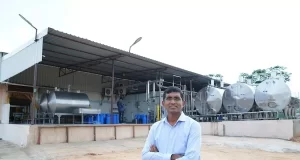The Union Budget is a crucial event in India’s economic calendar, and this year’s budget, presented by Finance Minister Nirmala Sitharaman, has generated a lot of buzz. The 2023 Union Budget has been dubbed as a growth-oriented budget, with a focus on reviving the Indian economy and supporting the country’s development. In this cover story, we’ll take a closer look at the key highlights of the budget and its impact on the dairy industry.

The agriculture credit target will be increased to 20 lakh crore with focus on animal husbandry, dairy and fisheries. With this backdrop, the government plans to implement a plan to set up massive decentralized storage capacity. This will help farmers store their produce and realize remunerative prices through sale at appropriate times. The government will also facilitate setting up of a large number of multipurpose 8 cooperative societies, primary fishery societies and dairy cooperative societies in uncovered panchayats and villages in the next 5 years.
I contacted Dr. Srijit Tripathi and Adv. Vijay Sardana after the budget was announced and had a good long talk with them. Dr. Srijit Tripathi serves as Global Technical Manager at Vetline and brings with him eight years of industry experience. Adv. Vijay Sardana has thirty years of experience in the industry.

On the overall view of the budget Dr. Tripathi said, “The central government since the inception of a separate ministry for Dairy, Animal Husbandry and Fisheries, has been focused towards the upliftment of the industry. This Amritkal budget with an allocation of ₹ 4327.85 Cr. has well recognised the sector’s contribution towards overall economic growth of the nation and therefore I appreciate the budget and hope the execution of the policies at ground level would also be ensured by the government.”
Adv. Sardana said, “The budget’s been made with a lot of care. ₹ 6000 crore has been set up for animal husbandry, The use of animal by-products in CNG production is brillant.” He then criticized the budget, “ There have been no provisions for the quality of feed and fodder for animals. This is an issue we need to address.”
Talking about Govardhan Yojana, Dr. Tripathi said, “This initiative focuses on waste to wealth and waste to energy objectives. It would not only increase the farmers’ secondary income but would also lead to cleanliness in rural India. Vector-borne infections would also be reduced in villages and thereby public health would be better.”
Then I asked at what price should the government buy manure from the farmers?
“Well, Any price would be less considering the present context of the Dairy Farmers. However, Under Indian conditions, a survey should be made in order to properly commercialize the by-products of a dairy farm as well as to utilize cow dung not just as a manure but other alternatives as well in profitable ways.”

Adv. Sardana had similar views, “The government should buy manures at market rate and should not try to fix rates. If this happens, it can turn into a political issue.”
Aatm Nirbhar Bharat Abhiyan for enhancing India’s manufacturing capabilities and Exports”, this PLI scheme for the food processing industry has been formulated. It has an outlay of Rs. 10900 Cr. Inclusion of the Food Processing Industry into this scheme with increased allocation is a good strategic move by the government. The domestic manufacturers will gain from the scheme either in setting up new units or expansion of the existing ones. It will help towards employment generation and boost domestic production. Moreover, India has the competitive advantage in terms of huge market, resources availability and demand for value added products.
Dr. Tripathi’s views on vaccination programs for the sheep and the goat plague running under the Livestock Health and Disease Control Programme were optimistic. He said, “From time to time, the governments work towards the eradication of different contagious infections in livestock and poultry. The scheme is, Peste des Petits Ruminants Eradication Program (PPR-EP). PPR is also known as sheep and goat plague. It is caused by a virus belonging to the genus Morbillivirus, family Paramixoviridaea and is a highly contagious infection affecting small ruminants. PPR virus can infect nearly 90 percent of an animal herd, and the mortality may range anywhere up to 70 percent of infected animals. The annual losses due to PPR are estimated to be in billions and therefore its control and eradication has become the need of the hour. This component would be covering the entire sheep and goat population in the country under vaccination against Peste des Petits Ruminants i.e. Sheep and Goat Plague.”
A decentralized storage system has been proposed for the farmers in the budget. When questioned how long will it take to accomplish such a humongous task Dr. Tripathi said, “It has a major objective to help farmers store their commodities and sell at the right time to get a fair value of their produce. It will impact the vision of our Prime Minister to enhance the farmers income. The feasibility will depend upon a number of factors. Timeline for this needs to be understood but the good crucial part would be their establishment and proper execution so as to fulfill the exact objectives. I hope to see some visible developments during this five year plan itself.”














